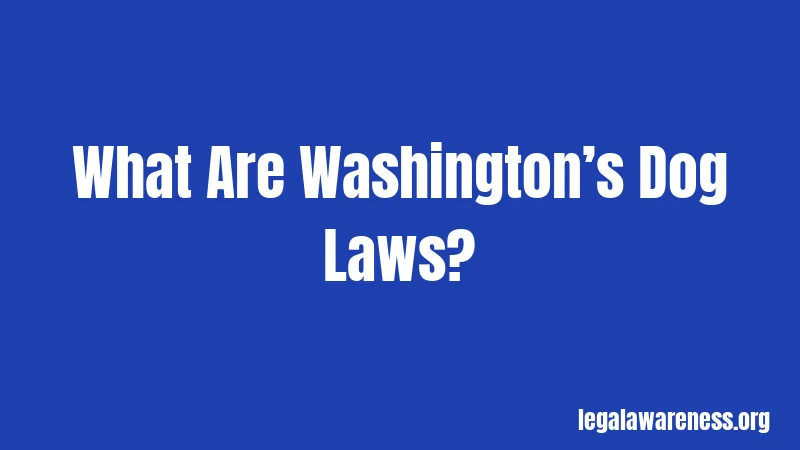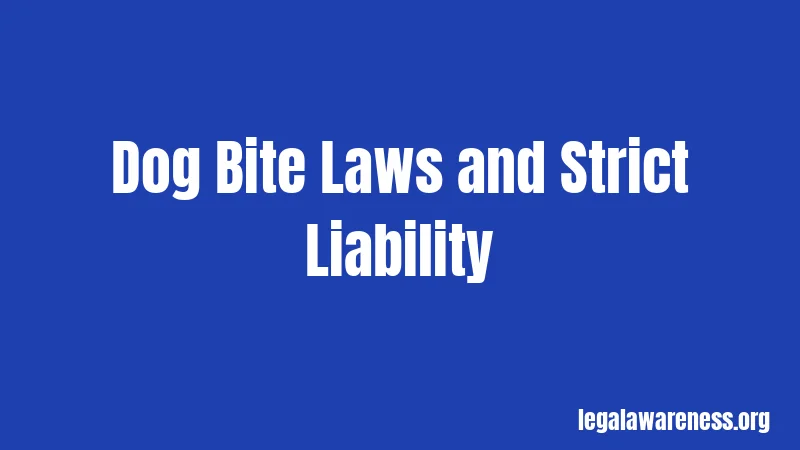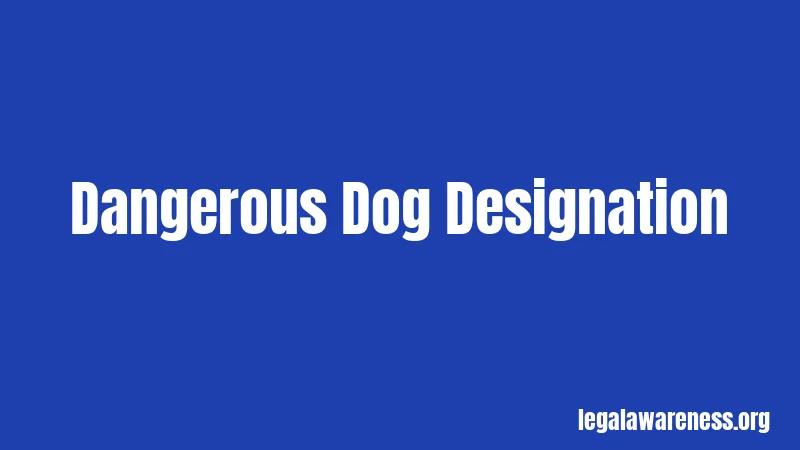Dog Laws in Washington (2026): Rules That Really Bite
Most dog owners in Washington have no clue about the strict laws they could be breaking. Seriously. You might think your dog is just being friendly, but the state sees things differently. Washington’s dog laws cover everything from bite liability to dangerous dog designations, and ignoring them can cost you thousands of dollars or even land you in jail.
Let’s break down exactly what you need to know.
What Are Washington’s Dog Laws?

Washington has a mix of state and local laws that govern dog ownership. The state handles the big stuff like dog bites and dangerous dogs. Cities and counties handle licensing and leash requirements.
Here’s the deal. State law focuses on keeping people safe. Local laws focus on keeping neighborhoods peaceful. Both can hit your wallet hard if you don’t follow them.
Rabies Vaccination Requirements
Every dog, cat, and ferret in Washington must have a current rabies vaccine. This isn’t optional. It’s state law under WAC 246-100-197.
Your dog needs its first rabies shot by 12 weeks of age. After that, you’ll need a booster one year later. Then you can switch to either one-year or three-year vaccines depending on what your vet recommends.
No exceptions exist for healthy dogs over 90 days old. Even if your dog never goes outside, the law still applies. Bats are Washington’s main rabies carriers, and they can get inside homes.
Cities and counties enforce this requirement. Some won’t license your dog without proof of vaccination. Others may fine you or impound your pet.
Dog Bite Laws and Strict Liability

Hold on, this part is important.
Washington uses strict liability for dog bites. That means you’re responsible if your dog bites someone, period. No questions about whether you knew your dog was dangerous. No debate about whether you were careless.
If your dog bites someone who’s legally on your property or in a public place, you’re liable. The victim can sue for medical bills, lost wages, pain and suffering, and more.
Only two defenses exist. First, the victim was trespassing. Second, your dog is a police dog doing its job. That’s it.
Sound strict? It is. Washington doesn’t follow the “one bite rule” that some states use. Your dog doesn’t get a free pass on the first bite.
Potentially Dangerous Dogs
Dogs can be labeled “potentially dangerous” based on their behavior. This designation comes from local animal control authorities.
A dog qualifies as potentially dangerous if it bites a person or domestic animal without provocation. It also applies to dogs that chase or approach people in a threatening way on public property.
Dogs known to have aggressive tendencies also fit this category. Basically, if your dog scares people or hurts animals, it might get labeled.
Local jurisdictions handle these cases. They set up their own rules for registration and control. Most require special licensing and increased supervision.
Dangerous Dog Designation

This one’s more serious.
A dog becomes “dangerous” when it severely injures a human without provocation. Dogs that kill domestic animals off their owner’s property also qualify.
Once declared dangerous, your dog faces strict requirements. You must register it with animal control. You need liability insurance, usually $250,000 minimum. The dog needs a secure enclosure on your property.
When off your property, the dog must be muzzled and on a leash. It also needs to be under the control of someone at least 18 years old.
Not sure what counts as a secure enclosure? It needs secure sides, a secure top, and protection from weather. It must prevent kids from entering and prevent the dog from escaping.
Penalties for Dangerous Dog Violations
Okay, pause. Read this carefully.
If your dangerous dog attacks someone or another animal, penalties get harsh fast.
First violation where your dangerous dog bites? Gross misdemeanor. You face up to 364 days in jail and fines up to $5,000. Animal control will confiscate your dog.
Second violation with a prior conviction? Class C felony. This means up to 5 years in prison and fines up to $10,000.
If your dog severely injures or kills someone? Class C felony automatically. You could serve up to 5 years regardless of prior convictions. Your dog will be destroyed.
Honestly, this is where responsible ownership becomes critical. Once your dog gets the dangerous label, mistakes cost everything.
Breed-Specific Laws and Exemptions
Here’s where things get interesting.
Washington allows cities to pass breed-specific laws. Currently, 27 cities have restrictions on pit bulls and similar breeds. But since 2019, there’s a catch.
Cities must exempt dogs that pass the American Kennel Club’s Canine Good Citizen test. This test checks if your dog behaves well around strangers, other dogs, and distractions.
Dogs that pass are exempt for two years. Then they need retesting. Failed tests can be retaken after a reasonable waiting period.
Right? This gives responsible owners a way around breed bans. It shifts focus from breed to behavior, which actually makes sense.
Local Licensing Requirements
No statewide licensing law exists. Each city and county makes its own rules.
Most communities require dog licenses. Fees vary widely. Some charge more for unaltered dogs to encourage spaying and neutering. Others offer lifetime licenses for altered pets.
Check with your local animal control to learn requirements. Some places link licensing to rabies vaccination proof. Missing a license usually means fines.
Leash Laws
Washington has no statewide leash law either. Cities and counties handle this locally.
Most urban and suburban areas require leashes in public. State parks require leashes no longer than 8 feet. Designated off-leash areas exist in many communities.
Your dog must be under your control at all times. Even without specific leash laws, you’re responsible for preventing your dog from causing harm.
Breaking leash laws can lead to fines. Worse, if your unleashed dog bites someone, you lose any defense about taking proper precautions.
Property Damage by Dogs
Dogs that chase or injure livestock face consequences. Property owners can legally kill dogs caught attacking their animals on their land or on public highways.
After the first incident, you must keep your dog leashed or confined. If you don’t, property owners can kill your dog if it returns.
This applies to damage to sheep, swine, poultry, and other domestic animals. The law takes livestock protection seriously.
What Happens After a Dog Bite
Animal control investigates every reported bite. They’ll quarantine your dog to check for rabies. This typically lasts 10 days.
During quarantine, your dog stays isolated. No rabies vaccination happens during this period. If your dog shows rabies symptoms or dies, animal control tests immediately.
Healthy dogs get released after 10 days. Unvaccinated dogs must receive rabies shots at the end of quarantine.
Stay with me here. The bite victim has three years to file a lawsuit. Civil cases are separate from animal control actions. You could face both.
Owner Definition Under Washington Law
“Owner” means more than you might think. It includes anyone possessing, harboring, keeping, or controlling a dog.
Pet sitters can be held liable. Family members watching your dog can be liable. Temporary caretakers face the same responsibility as legal owners.
This expanded definition protects bite victims. It ensures someone pays for damages even if the legal owner wasn’t present.
Special Rules for Police Dogs
Police dogs and accelerant detection dogs have special protections. Handlers using these dogs properly have immunity from civil lawsuits.
State and local governments aren’t strictly liable for police dog actions. Dogs performing official duties don’t count as violations if someone gets bitten.
This exception makes sense. Police dogs serve essential public safety functions. They’re highly trained professionals.
Dog Breeding Regulations
Commercial breeding faces limits too. Breeders need proper licensing under certain conditions.
Regulations cover the number of dogs, living conditions, and health standards. Violations bring penalties. The state wants to prevent puppy mills and ensure humane treatment.
How to Report Dangerous Dogs
Wondering if you should report a dog? Contact your local animal control authority.
They handle investigations and make dangerous dog determinations. You can usually reach them through your city or county government.
Provide details about the incident. Include dates, locations, and witness information. Photos help if you have them.
Protecting Yourself as a Dog Owner
Here’s what you need to do. First, keep rabies vaccinations current. This protects your dog and satisfies legal requirements.
Second, control your dog at all times. Use leashes in public. Secure your yard with proper fencing.
Third, socialize and train your dog. Well-behaved dogs avoid dangerous situations. They’re less likely to bite or scare people.
Fourth, get homeowner’s or renter’s insurance that covers dog bites. Most policies include this, but check. Some exclude certain breeds.
Fifth, if your dog bites someone, take it seriously. Contact a lawyer. Don’t admit fault. Let professionals handle it.
If You’re Bitten by a Dog
Seek medical attention immediately. Even small bites can cause serious infections.
Report the bite to animal control. They’ll investigate and quarantine the dog.
Document everything. Take photos of injuries. Get witness contact information. Keep medical records.
You have three years to file a claim. But don’t wait. Evidence disappears. Memories fade.
Honestly, most dog bite cases settle through insurance. But you need documentation to prove your case.
Frequently Asked Questions
Does Washington require dog licenses?
No statewide requirement exists. Cities and counties set their own licensing rules. Check with your local animal control for requirements in your area.
What happens if my dog bites someone on my property?
You’re liable unless the person was trespassing. Washington uses strict liability for dog bites. The victim can sue for damages regardless of your dog’s history.
Can my city ban my dog’s breed?
Yes, but with limits. Cities can pass breed-specific laws, but they must exempt dogs that pass the AKC Canine Good Citizen test. The exemption lasts two years.
How long does a dangerous dog designation last?
It’s permanent unless overturned through the appeals process. Once labeled dangerous, your dog faces lifetime restrictions and requirements.
Can I fight a dangerous dog designation?
Yes. Cities and counties with these procedures must provide notification and an appeal process. You can challenge the designation before it becomes final.
What’s the difference between potentially dangerous and dangerous dogs?
Potentially dangerous dogs have shown aggressive behavior but haven’t severely injured anyone. Dangerous dogs have severely injured humans or killed domestic animals. The penalties differ significantly.
Do I need insurance for my dog?
Not unless it’s declared dangerous. Then you typically need $250,000 in liability insurance. But getting coverage anyway is smart protection.
What if someone provokes my dog before a bite?
Provocation is a complete defense to liability. The victim must prove they didn’t provoke the attack to win damages.
Final Thoughts
Washington takes dog laws seriously. The strict liability rule means you’re always on the hook if your dog bites. The dangerous dog penalties can destroy your life and end your dog’s.
Now you know the basics. Stay informed, stay safe, and when in doubt, keep your dog under control. Better yet, train them well and socialize them early. Prevention beats dealing with lawsuits and criminal charges.
References
- Washington State Department of Health – Rabies Vaccination Requirements: https://doh.wa.gov/you-and-your-family/illness-and-disease-z/rabies/rabies-vaccination-requirements-dogs-cats-and-ferrets
- Revised Code of Washington Chapter 16.08 – Dog Laws: https://app.leg.wa.gov/rcw/default.aspx?cite=16.08
- RCW 16.08.100 – Dangerous Dogs Penalties: https://app.leg.wa.gov/rcw/default.aspx?cite=16.08.100
- Washington Administrative Code 246-100-197 – Rabies Measures: https://app.leg.wa.gov/wac/default.aspx?cite=246-100-197
- MRSC – Dangerous Dogs Regulations: https://mrsc.org/explore-topics/public-safety/animal-control/dangerous-dogs
